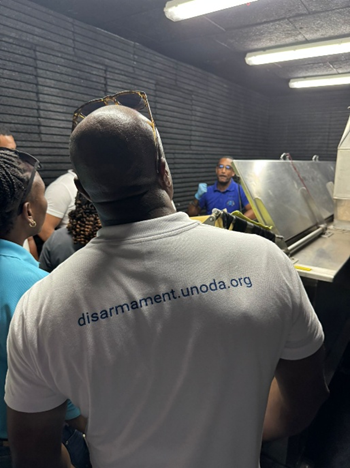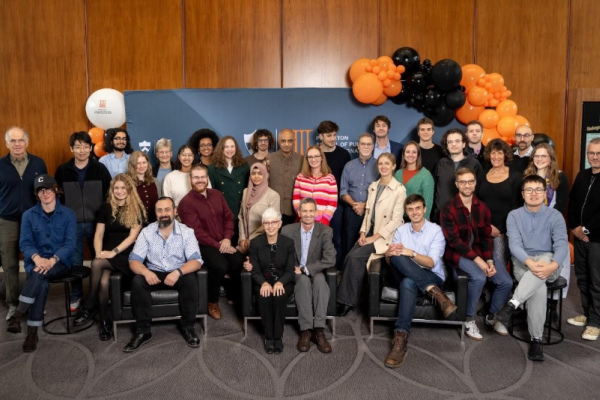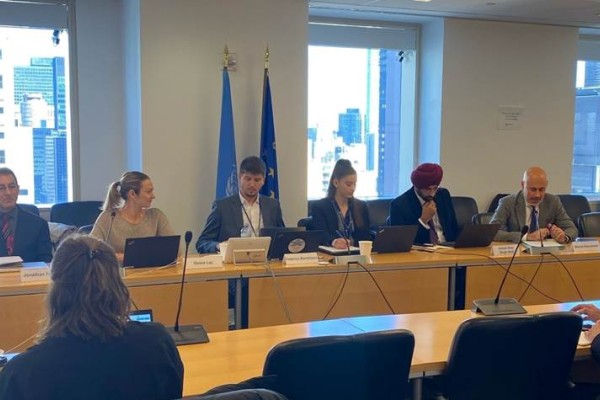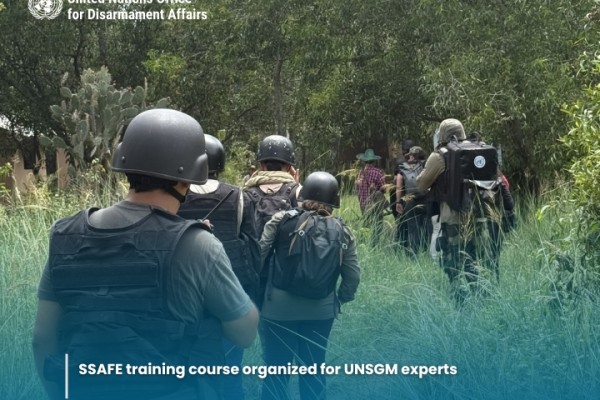Зажигание регионального опыта: Карибский бассейн принимает у себя первую программу обучения стипендиатов по ЛСО
Управление ООН по вопросам разоружения (УООНВР) официально объявило о начале первого выпуска своей Программы подготовки стипендиатов по контролю за стрелковым оружием и легкими вооружениями (ЛСО), положив начало новой смелой главе в создании регионального потенциала в странах Карибского бассейна.
С 28 июля по 15 августа 2025 года девятнадцать стипендиатов из пятнадцати государств-членов КАРИКОМ собрались в Тринидаде и Тобаго для прохождения интенсивного трехнедельного обучения. Стипендия, организованная в тесном сотрудничестве с Учебным и научно-исследовательским институтом ООН (ЮНИТАР), Региональным центром ООН по вопросам мира, разоружения и развития в Латинской Америке и Карибском бассейне (ЮНЛИРЕК) и правительством Тринидада и Тобаго, сочетает в себе юридическую, техническую и полевую подготовку для усиления национальных и региональных мер по противодействию угрозам, связанным с незаконным распространением стрелкового оружия и легких вооружений.
В первую когорту стипендиатов из стран Карибского бассейна вошли старшие офицеры правоохранительных органов, военные, криминалисты, эксперты по вопросам политики, а также юридические и технические консультанты, объединенные общей целью: укрепить усилия по контролю над вооружениями в своих странах и во всем регионе.
Обучение, выходящее за рамки классной комнаты
Программа началась с самостоятельного онлайн-курса, знакомящего с основными понятиями в области разоружения, международных документов и механизмов контроля ЛСО. Но именно в Тринидаде и Тобаго обучение стало по-настоящему живым.
В течение трех недель стипендиаты занимались по насыщенной учебной программе, охватывающей правовые и политические основы, региональную динамику ЛСО, управление запасами, уничтожение оружия, судебную баллистику, пограничный контроль и предотвращение незаконного оборота, а также такие важные междисциплинарные темы, как учет гендерных аспектов, безопасность человека и влияние вооруженного насилия. В дополнение к этому комплексному курсу обучения программа подготовки стипендиатов включала уникальную серию полевых визитов и живых демонстраций, которые превратили теорию в яркое практическое обучение.
Криминалистическое путешествие по огнестрельному оружию и баллистике

В баллистическом отделении оружейной комнаты Полицейской службы Тринидада и Тобаго стипендиаты наблюдали за испытательным выстрелом из найденного огнестрельного оружия в резервуар с водой - контролируемый метод, используемый для захвата пуль без повреждений, что очень важно для баллистического сравнения. Демонстрация позволила близко познакомиться с тем, как проверяется и анализируется оружие, найденное на месте преступления, и раскрыть научные основы криминалистики, которые часто играют решающую роль в раскрытии преступлений, связанных с оружием.
Во время посещения Центра криминалистики Тринидада и Тобаго эксперт по баллистике продемонстрировал, как использовать сравнительный микроскоп для изучения гильз и стреляных пуль. Выявляя индивидуальные маркировки, этот метод позволяет следователям связать огнестрельное оружие с конкретными инцидентами, что является жизненно важным шагом в уголовном расследовании и судебном преследовании.
Маркировка, отслеживание и память

В полицейском арсенале стипендиаты стали свидетелями демонстрации лазерной гравировки, в ходе которой на огнестрельное оружие наносилась импортная маркировка. Этот процесс, необходимый для соблюдения нормативных требований и улучшения отслеживания, подчеркнул важность правильной идентификации в борьбе с утечкой и незаконным оборотом стрелкового оружия.
Пожалуй, самый отрезвляющий момент произошел во время посещения мемориала Кэмп Омега, где капрал в отставке Габриэль поделился историей двух солдат и четырех пожарных, погибших в 1988 году в результате взрыва, связанного с пожаром в кустарнике, воспламенившим место хранения запасов, что стало отрезвляющим напоминанием о важности безопасных методов обеспечения физической безопасности и управления запасами (PSSM).
Взрывчатые вещества и опыт: Контролируемая детонация
В один из самых незабываемых моментов программы стипендиаты посетили лагерь "Омега", чтобы вместе с Силами обороны Тринидада и Тобаго (TTDF) вживую продемонстрировать безопасную утилизацию боеприпасов и открытую детонацию взрывчатых веществ.
Шаг за шагом стипендиаты наблюдали за сборкой зарядов взрывчатки, детонирующих шнуров и стреляющих кабелей, причем все это происходило в соответствии со строгими правилами безопасности. Это упражнение продемонстрировало дисциплину, координацию и техническую точность, необходимые для безопасного обращения со взрывчатыми веществами.
Этот опыт наглядно показал, что контроль над ЛСО - это не только предотвращение попадания оружия в чужие руки, но и обеспечение управления, хранения и уничтожения опасных материалов таким образом, чтобы защитить жизни и сообщества.
Развитие проекта: Превращение знаний в национальное воздействие

В последнюю неделю обучения стипендиаты переключили внимание на будущее. Под руководством наставников каждый стипендиат начал разрабатывать проектное предложение для конкретной страны, направленное на решение проблем в области контроля ЛСО в национальном и институциональном контексте. Эти индивидуальные инициативы, разработанные на основе технической подготовки стипендиатов и с учетом национальных потребностей, послужат ориентированными на конкретные действия проектами изменений на родине.
Будь то усиление пограничного и портового контроля, совершенствование систем регистрации и маркировки огнестрельного оружия, повышение безопасности запасов или разработка национальной политики по уничтожению и отслеживанию оружия, проекты стипендиатов основаны на конкретных потребностях их стран. Все вместе они отражают то, как Стипендия зарождает идеи и дает участникам возможность воплотить техническую подготовку в практические, целенаправленные действия по улучшению контроля над ЛСО во всех странах Карибского бассейна.
Модель для региональных и глобальных изменений

Запуск программы обучения стипендиатов по ЛСО в странах Карибского бассейна - это только начало. В рамках более широких усилий УНП ООН по поддержке реализации Программы действий (ПД) и Международного инструмента отслеживания (МИТ), стипендия направлена на создание глобальной сети специалистов по контролю ЛСО, способных возглавить национальные реформы и региональное сотрудничество. Следующая итерация будет сосредоточена на африканском регионе: вторая когорта стипендиатов должна собраться с 20 октября по 7 ноября в Ломе, Того, и Уайде, Бенин, в партнерстве с Региональным центром ООН по вопросам мира и разоружения в Африке (UNREC).




